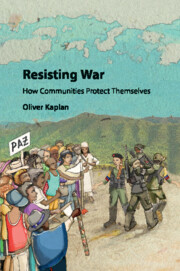Book contents
- Frontmatter
- Dedication
- Contents
- List of Figures
- List of Tables
- Preface and Acknowledgments
- List of Abbreviations
- 1 Introduction: Civilian Autonomy in Civil War
- 2 A Theory of Civilian Decision-Making in Civil War
- 3 The History of Conflict and Local Autonomy in Colombia
- 4 Living to Tell About It: Research in Conflict Settings
- 5 How Civilian Organizations Affect Civil War Violence
- 6 Why Some Communities Are More Organized than Others
- 7 The Institution of the ATCC: Protection through Conciliation
- 8 Discovering Civilian Autonomy in Cundinamarca
- 9 Civilian Autonomy around the World
- 10 Conclusions and Policy Implications
- Appendix A Archives Consulted
- Appendix B Supplementary Documentation on the ATCC
- Glossary
- References
- Index
Appendix B - Supplementary Documentation on the ATCC
Published online by Cambridge University Press: 13 June 2017
- Frontmatter
- Dedication
- Contents
- List of Figures
- List of Tables
- Preface and Acknowledgments
- List of Abbreviations
- 1 Introduction: Civilian Autonomy in Civil War
- 2 A Theory of Civilian Decision-Making in Civil War
- 3 The History of Conflict and Local Autonomy in Colombia
- 4 Living to Tell About It: Research in Conflict Settings
- 5 How Civilian Organizations Affect Civil War Violence
- 6 Why Some Communities Are More Organized than Others
- 7 The Institution of the ATCC: Protection through Conciliation
- 8 Discovering Civilian Autonomy in Cundinamarca
- 9 Civilian Autonomy around the World
- 10 Conclusions and Policy Implications
- Appendix A Archives Consulted
- Appendix B Supplementary Documentation on the ATCC
- Glossary
- References
- Index
Summary
A NOTE ON VARIABLES AND “CASES”
The complex explanatory framework in Chapter 7 runs the risk of the number of independent variables exceeding the number of cases (the “n-k problem”). Under these circumstances, there is not ample variation to test and rule in (or out) different factors. I argue that the ATCC's investigation institution interacts with civilian “pacifist” norms to limit violence against civilians. This arrangement is further primarily supported when a third condition is present – that armed actor preferences are not excessively hostile to the institution's existence. When variables representing alternative hypotheses such as Military Balance of Control and Armed Actor Resources are considered, even more cases are required for testing.
As a solution, I tap three kinds of variation within the ATCC meta-case. First, I look at temporal variation in the dependent variable of violence against civilians over time. In the ATCC case, the changes in violence can be roughly classified into the three different time periods. Second, I examine cross-sectional variation in violence between the ATCC region and communities in neighboring regions (lumped together). These cases are relevant “controls” since they likely share similar characteristics, including armed group fronts, geography, and perhaps demography. Third, I consider counterfactual worlds as additional cases (Fearon 1996). In theory, counterfactual cases can be derived for each variable-time-period (e.g., what would have happened in case c during year y if independent variable x had been present, or not present?). The Table B.1 presents the various relevant factual and counterfactual cases. I identify variation across eleven real and counterfactual sub-cases within the ATCC meta-case, which should help add confidence to civilian autonomy theory with more cases than the seven independent variables (counterfactuals are highlighted).
QUALITATIVE DISCUSSION OF ADDITIONAL EXPLANATIONS FOR TRENDS IN VIOLENCE
This section assesses how various extant explanations account for the observed trends in violence over time. Specifically, it seeks to account for the surprising era of the absence of violence during the 1990s. Beyond shifts in territorial control, these explanations are: general (national) trends in violence and peace overtures, changing rebel organization and discipline, and increased international support (see Table 7.1). I assess these hypotheses with various “cases” within the ATCC meta-case.
Information
- Type
- Chapter
- Information
- Resisting WarHow Communities Protect Themselves, pp. 319 - 332Publisher: Cambridge University PressPrint publication year: 2017
